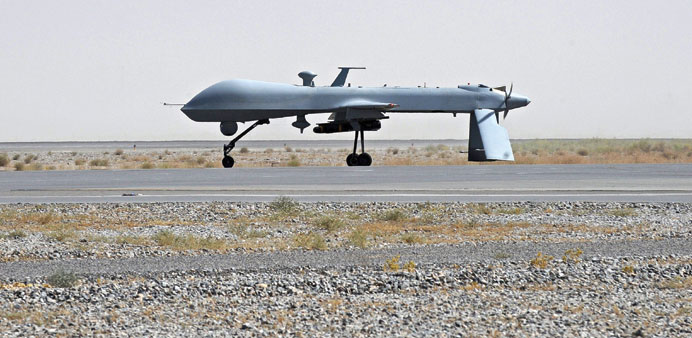|
|
The US is preparing a possible redeployment of its drones in Niger to set up a forward base in the Sahara closer to Islamist militants blamed for attacks across the region, US military and Defence Department officials said.
Washington deployed unarmed surveillance drones in Niger after a French-led military operation last year destroyed an Al Qaeda enclave in neighbouring northern Mali. Supported by some 120 US military personnel, they operate from a base outside the capital Niamey.
Under the new plan, which is still being assessed by the US military, that base would be relocated to the city of Agadez around 750km (460 miles) northeast of Niamey.
“Geographically and strategically, Agadez presents an attractive option...given its proximity to the threats in the region,” Benjamin Benson, spokesman for the US military’s Africa Command, told Reuters.
Bolstered by weapons looted from Libyan government arsenals, Islamist fighters took advantage of a Tuareg uprising and military coup in Mali to seize the country’s desert north in 2012.
French troops and their West African regional allies succeeded in driving them back early last year. But Al Qaeda-linked groups continue to operate across a loosely governed zone with porous borders straddling Niger, Mali, Mauritania, Algeria and Libya.
Civilian and military officials in Niger told Reuters yesterday that the government had already given its green light to the plan to establish the base in Agadez.
“Niger has given its total consent,” a senior Nigerien military officer said. “The goal is to secure our borders against jihadist infiltrations. Libya, for example, is gripped by turmoil and so surveillance must be reinforced there.”
Niger said last year it would welcome the deployment of armed US drones after Islamist launched twin attacks on a uranium mine operated by French nuclear energy company Areva at Arlit and a military barracks in Agadez.
The US has also deployed drones to Niger’s neighbour Chad, where they have been used in the search for more than 200 Nigerian schoolgirls abducted by the Islamist group Boko Haram in April.
Meanwhile, the US Navy, concerned about the affordability of a new carrier-based unmanned spy plane, has delayed this month’s planned kickoff of the competition to build it, officials said yesterday.
They said the Navy will wait to seek proposals for the contract until after the Pentagon conducts a broad review this fall of intelligence and surveillance programmes. Many large US weapons makers have expressed interest in competing for the new Unmanned Carrier Launched Airborne Surveillance Strike (UCLASS) contract, one of few new weapons programs up for grabs in a tough budget climate.
Navy officials had hoped to release a final request for proposals for the UCLASS this month, after a meeting of Pentagon officials on September 10.

